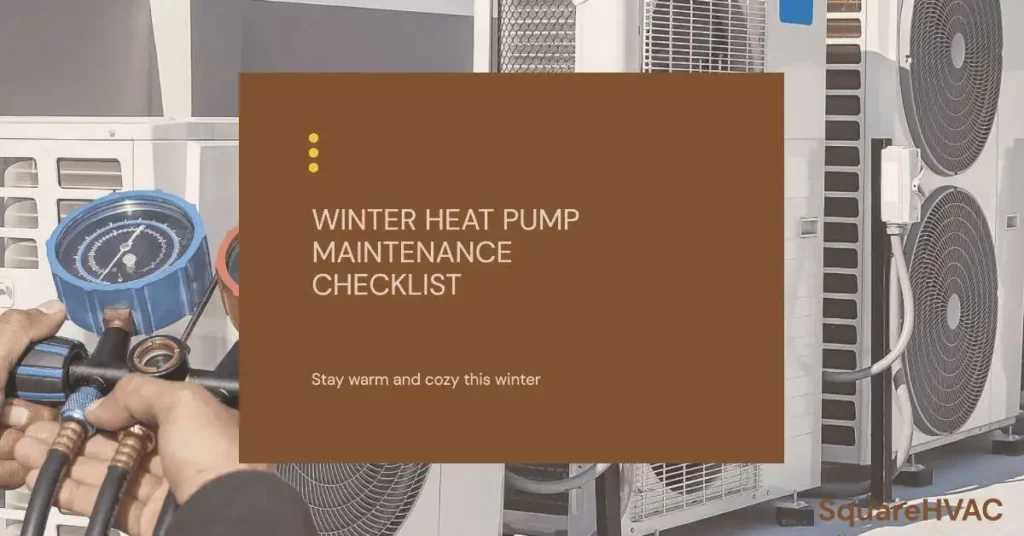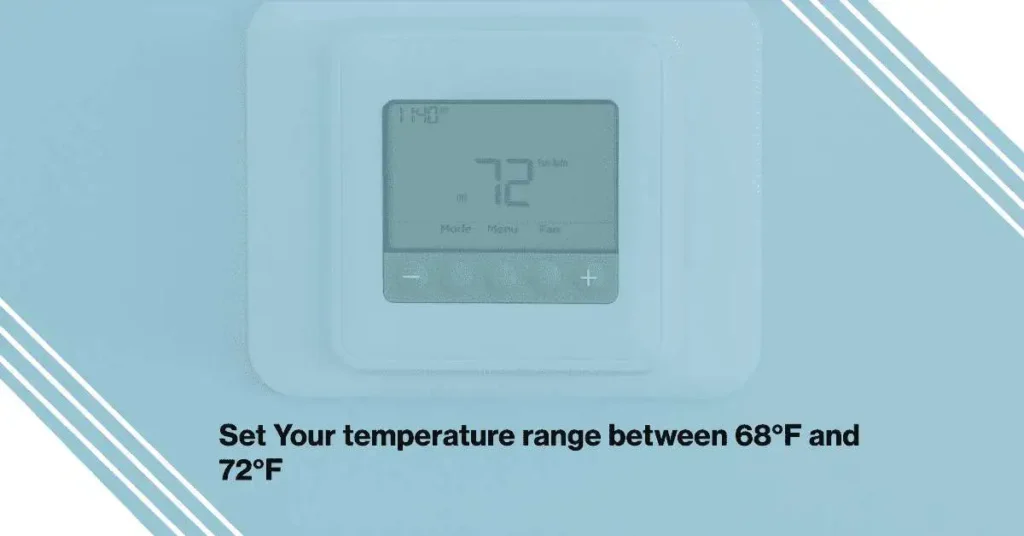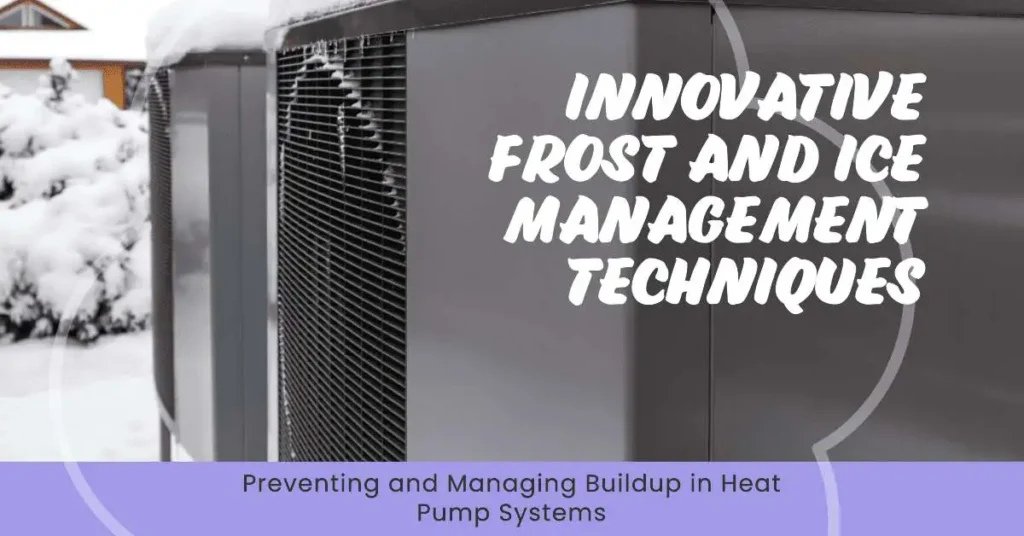Winter heat pump maintenance is a crucial aspect of ensuring your heating and cooling system operates efficiently during the colder months. Neglecting maintenance can lead to decreased performance and potentially costly repairs.
Why Winter Heat Pump Maintenance Matters
Table of Contents
ToggleWinter maintenance for heat pumps is critical due to the unique challenges these systems face in cold weather:
- Cold Weather Challenges: Heat pumps are less efficient in colder temperatures. As the temperature drops, the heat pump must work harder to extract heat from the outside air or ground. This can lead to reduced efficiency and increased energy consumption, affecting your comfort and utility bills.
- Optimal Efficiency: Maintaining efficiency during winter is essential to ensure your heat pump can provide sufficient heating. Proper maintenance helps the system run smoothly, avoiding breakdowns and ensuring a consistent and comfortable indoor environment.
Winter heat pump maintenance: Checklist

Step-by-step checklist for preparing your heat pump for winter:
- Replace Air Filters: Regularly clean or replace air filters to ensure proper airflow and heating efficiency. Clogged filters can strain the system.
- Clear Outdoor Area: Remove debris, snow, and any obstructions around the outdoor unit to maintain proper airflow.
- Inspect Thermostat: Check your thermostat settings. Programmable thermostats can help optimize heating schedules and save energy.
- Seal Leaks: Ensure there are no air leaks in your home. Proper insulation and sealing gaps will help retain heat.
- Schedule Professional Maintenance: Consider a professional maintenance check before winter to address any potential issues and optimize system performance.
- Monitor Temperatures: Be mindful of the outdoor temperature. Some heat pumps may require a backup heating source in extreme cold.
Tips on Setting the Thermostat and Managing the System Effectively

- Optimal Temperature: Set your thermostat to an energy-efficient temperature during the day and lower it at night when you’re sleeping or away.
- Use Programmable Thermostats: Utilize programmable thermostats to create heating schedules that align with your daily routines.
- Avoid Frequent Adjustments: Avoid constant temperature adjustments, as this can increase energy consumption.
- Regularly Check Filters: Continuously monitor and clean or replace filters as needed for efficient airflow.
Cleaning and Basic Maintenance
Cleaning the Outdoor Unit:
- To clean the outdoor unit of your heat pump, turn off the power to the system.
- Use a hose or gentle pressure washer to rinse away dirt, leaves, and debris from the unit. Start from top to bottom.
- For stubborn dirt, mix a solution of equal parts water and vinegar, and gently scrub the unit with a soft brush.
- Ensure that the unit is completely dry before turning the power back on.
Changing or Cleaning Air Filters:
- Regularly check and change or clean your heat pump’s air filters. This is essential for maintaining efficient airflow.
- Most air filters can be easily removed. If they are reusable, clean them with a vacuum cleaner or wash them with water and mild detergent. Replace disposable filters as needed.
Lubricating Moving Parts:
- Consult your heat pump’s manual to identify moving parts that require lubrication. Common parts include fan motors and bearings.
- Use manufacturer-recommended lubricants and follow the guidelines for the proper amount to apply.
Clearing Obstructions Around the Outdoor Unit:
- Regularly inspect the area around the outdoor unit. Remove any debris, leaves, or plant growth that might obstruct airflow.
- Ensure there is at least two feet of clear space around the unit for proper ventilation.
- These basic maintenance tasks are crucial for efficiently operating your heat pump and can help extend its lifespan.
Signs of Trouble
Common problems heat pumps may encounter in winter:
- Inefficient Heating: Heat pumps can struggle to provide sufficient warmth in very cold weather, resulting in reduced heating efficiency.
- Ice Accumulation: Ice can form on the outdoor unit, hindering heat exchange and affecting the system’s performance.
- Short Cycling: Heat pumps may cycle on and off frequently, which can indicate issues with temperature control or sensors.
How to identify and troubleshoot issues:
- Inspect the Outdoor Unit: If you notice ice accumulation or unusual frost on the outdoor unit, it’s a sign of reduced efficiency. Turn off the heat pump and allow the ice to melt. Ensure proper drainage and check for obstructions.
- Check Air Filters: Clogged or dirty air filters can impede airflow. Replace or clean them to improve heating efficiency.
- Thermostat Settings: Ensure the thermostat is set to the desired temperature. Programming a consistent schedule helps maintain efficiency.
Frost and Ice Management

Dealing with frost and ice buildup on the outdoor unit:
- Preventive Measures: Regularly clear snow and ice from the outdoor unit. Avoid using sharp tools that could damage the unit.
- Defrost Function: Many modern heat pumps have a defrost function that automatically melts ice. If your heat pump has this feature, use it.
Techniques to prevent ice-related problems:
- Maintain Proper Clearance: Ensure there is sufficient space around the outdoor unit to allow for proper airflow. Clear any obstructions.
- Install a Cover: Some homeowners use covers to shield the outdoor unit from direct exposure to ice and snow. However, consult your manufacturer’s recommendations before doing so.
Professional Heat Pump Inspections
Importance of regular professional inspections:
- Optimal Performance: Regular inspections by a qualified HVAC technician ensure your heat pump operates at peak efficiency, minimizing breakdowns.
- Longevity: Professional maintenance can extend the lifespan of your heat pump, protecting your investment.
When to schedule maintenance visits:
Twice a Year: It’s recommended to schedule maintenance visits before both the heating and cooling seasons to address any issues before they become critical.
Need A Heat Pump Repair Or Maintenance? Feel Free To Contact SquareHVAC If You Live In Chicago Illinois
Energy Efficiency Tips
Maintaining energy efficiency during the winter:
- Sealing Leaks: Ensure that doors and windows are well-sealed to prevent drafts and heat loss.
- Proper Insulation: Adequate insulation in your home can significantly reduce heat transfer and lower energy bills.
- Programmable Thermostats: Utilize programmable thermostats to automatically adjust temperatures when you’re not home or at night to conserve energy.
- Sunlight Utilization: Open curtains on south-facing windows during the day to harness natural sunlight for heating.
- Regular Maintenance: Keep your heating system well-maintained to ensure it operates at peak efficiency.
You Might Be Interested in: EER vs CEER: Energy Efficiency Ratings
Using programmable thermostats effectively:
Programmable thermostats allow you to set different temperatures for various times of the day, optimizing energy use. For winter, consider programming:
- Lower temperatures when you’re away or sleeping.
- Slightly higher temperatures during waking hours.
- Avoid drastic temperature fluctuations, which can consume more energy.
DIY vs Professional Maintenance
tasks suitable for homeowners to do themselves:
- Air Filter Replacement: Regularly change or clean air filters to maintain airflow and system efficiency.
- Sealing Leaks: Apply weatherstripping or caulking to seal gaps around doors and windows.
- Basic Insulation: DIY insulation improvements can be done in accessible areas like attics and crawl spaces.
In summary, winter heat pump maintenance is essential to ensure its optimal performance. Here are the key takeaways:
- Regular Cleaning and Filter Replacement: Cleaning or replacing air filters and keeping air vents clean is vital for efficient operation.
- Thermostat Updates: Make necessary updates to your thermostat settings to ensure your heat pump is working at the right temperature.
- Avoiding Buildup: Be proactive in preventing the buildup of snow, ice, and leaves around your heat pump unit, which can hinder its efficiency.
- Scheduled Tune-Ups: It’s crucial to schedule heating tune-ups to address any issues and keep your heat pump in top shape.
- Energy Efficiency: Regular maintenance not only ensures your comfort but also leads to energy savings, contributing to a sustainable future for our planet.


